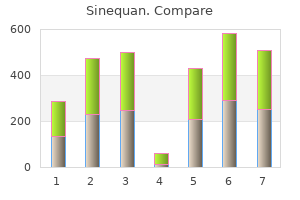"Purchase sinequan visa, anxiety headache".
By: U. Jose, M.A.S., M.D.
Medical Instructor, California Northstate University College of Medicine
Of note anxiety kava buy generic sinequan online, the breast milk microbiota in mothers having a cesarian section differs from that of mothers having a vaginal delivery [6] anxiety while driving discount 75 mg sinequan free shipping. Microbes are also exchanged via skin contact and exposure to the microbiota in the immediate environment anxiety buzzfeed 10 mg sinequan otc. Every individual has a unique anxiety or heart attack discount 10 mg sinequan amex, characteristic microbiota during later phases of breastfeeding that comprises a dynamic mixture of microbes typical to each individual. Weaning, introduction of solid foods, and antimicrobial drug treatment will break the constant supply of oligosaccharides and microbes from the mother, thus affecting intestinal microbiota development. Bifidobacterium and Ruminococcus species dominate the intestinal microbiota with highlevel, stable expression over time. A Canadian study on 4-month-old infants reported higher bifidobacterial levels and lower clostridial numbers in breastfed infants than in infants receiving formula [14]. The healthy intestinal microbiota in infancy is characterized by a large Gram-positive bacterial population which contains significant numbers of bifidobacteria, mainly B. Lactic acid bacteria may play a role in providing the right intestinal environment for bifidobacteria to dominate. A healthy microbiota during infancy is particularly important as this establishes the basis for healthy gut microbiota later in life. Gut Microbiota in Infants from Six Months Onward After the first 6 months of life, the microbiota becomes more diverse [1, 6, 9]. Relative changes in gut microbiota composition suggested by culture-dependent and culture-independent studies. The numbers of bifidobacteria can be influenced by diet, probiotics and prebiotics. Weaning is associated with changes including increased levels of Escherichia coli, enterococci, bacteroides and anaerobic gram-positive cocci and decreased enterobacteria. Early change of the microbiota to the adult type may be linked with development of eczema [9]. The intestinal microbiota is crucial for normal development of the gut-associated lymphoid tissue and has important effects on intestinal mucosal barrier function and other aspects of intestinal function. Immune Development Microbial colonization of the newborn intestine is required for normal immune development, which in turn is important for regulation of gut inflammatory responses and oral tolerance induction. The mucosal immune system of the gastrointestinal tract is constantly challenged by diverse antigens, such as microbial and food antigens. Such priming of the gut-associated lymphoid tissue is important for two opposing functions: mounting a response to pathogens and maintaining hyporesponsiveness to innocuous antigens. Mice raised in a germ-free environment fail to develop oral tolerance and have a persistent Th2dependent antibody response [11]. This immune deviation can be corrected by reconstitution of intestinal microbiota, but only if this occurs during the neonatal period [11]. Prenatal exposure to companion animals is linked with changes in microbiota and infantile pet exposure is negatively associated with wheezy bronchitis at 24 months of age [10]. The strains of healthy gut microbiota are likely to stimulate local and systemic immune responses via pattern recognition molecules such as Toll-like receptors, providing the host with an anti-inflammatory stimulus and directing the host-microbe interaction toward immune tolerance. The bifidobacteria-dominated environment in childhood in particular may provide more of an anti-inflammatory stimulus than bacteria from adults, which have been shown to be more proinflammatory. A complex microbial community is required to achieve a healthy microbiota that exhibits powerful antipathogenic and anti-inflammatory capabilities. Intestinal Function An absent or inadequate intestinal microbiota has been shown to cause defects in intestinal barrier function. Before weaning, formulafed infants have a greater ability to ferment complex carbohydrates than breastfed infants, probably due to the presence of a more complex microbiota. Breastfed infants have delayed establishment of mucin-degrading microbiota, but this increases in both groups between 6 and 9 months.

One main reason behind the drastic fall in breastfeeding to low rates in the late 19th century and in the 20th century was widespread advertising by formula companies anxiety symptoms 6 days purchase cheap sinequan line. During the 1970s and 1980s anxiety brain order cheapest sinequan and sinequan, breastfeeding rates picked up again anxiety kids purchase genuine sinequan on-line, especially with older and educated mothers in industrialized countries anxiety 60mg cymbalta 90 mg prozac discount 75 mg sinequan with visa. Formula companies responded by vigorously seeking new markets in the developing world. Companies started giving gifts and other incentives to health workers for promoting formulae. The International Code On May 21, 1981, the 34th meeting of the World Health Assembly adopted the fourth draft of the International Code of Marketing of Breast-Milk Substitutes as a minimum requirement to protect and promote appropriate feeding of infants and young children [4]. It was developed to protect mothers and health workers from commercial pressure by manufacturers of breast milk substitutes. It forbids provision of free samples to mothers or health facilities (except for professional research), because of their negative impact on breastfeeding. It also forbids inducements to health workers, because recipients are more likely to promote a particular product and remain passive in promoting breastfeeding (table 1). By the 1996 World Health Assembly meeting, all 191 member states had affirmed their support for the code, its implementation and the implementation of relevant resolutions. The code also covers ethical considerations and regulations for the marketing of feeding bottles and teats. Even after 3 decades of implementation of the code there are continuing issues of implementation, monitoring and compliance, which predominantly reflect weak governance [5]. Monitoring the Code Violations of the Code Since 1981, when the code was formulated, numerous violations have been reported both from the developing and the developed world. In developing nations, multistage, random sampling of pregnant mothers and mothers of infants less than 6 months old was carried out in 4 cities (Dhaka, Durban, Bangkok and Warsaw) with disappointing results: 26% of mothers in Bangkok received free samples of breast milk substitutes from companies [6]. Many violations were reported in Uganda in a survey of mothers and health workers. In 2008, 70% of 427 health professionals in Pakistan were unaware of their own breastfeeding laws, and 80% unaware of the code; 12% had received sponsorship from pharmaceutical companies for training sessions or attendance at conferences [7]. In India, where advertising is strictly controlled by the Infant Milk Substitutes Act [8], breastfeeding rates are 46% at 5 months of age. In contrast, the Philippines, with much weaker regulations, have 3 times lower breastfeeding rates [9]. In the developed world, marketing tends to be more subtle than in developing countries [10]. The reports on violations demonstrate the need for transparent, independent and effective controls in the marketing of baby food and bottles. Governments should ensure a consistent strategy of monitoring, involving investigation, observation and recording of information. The basics of monitoring include: familiarization with the main points of the International Code and with national measures; obtaining information on the breast milk substitutes locally used; recording details about the company and brand names and the hospitals/clinics where infant formula is used; description of posters, displays, etc. It is now recognized that voluntary initiatives alone are inadequate for implementation of the International Code of Marketing of Breast-Milk Substitutes. Health professionals and breastfeeding organizations call for enforcement of stricter rules. Under the international code, information provided by the manufacturers should not imply or create a belief that bottle feeding is equivalent or superior to breastfeeding. Impact on Mortality and Morbidity In developing countries, numerous studies have reported an increased mortality and morbidity with the use of breast milk substitutes. In a Ghanaian study, neonatal mortality of babies fed after the first 24 h was more than twice that of those fed within the first hour. In the developed world, exclusive breastfeeding has no detectable effect on mortality, but significant reductions in both short-term and long-term morbidity were noted.
Sinequan 10 mg sale. How I Cope With Anxiety (+ BetterHelp) | Laineybot.

Syndromes
- Stroke
- Learn and perform Kegel exercises (pelvic strengthening exercises).
- Rash
- The quadriceps tendon (where the thigh muscles attach to the top of the kneecap)
- AIDS (less common now because of better AIDS treatments)
- You may be asked to drink only clear liquids such as broth, clear juice, and water after noon.
- Slurred or difficult-to-understand speech
- Antibiotics are used for 2 weeks or more
- Avoiding being alone







